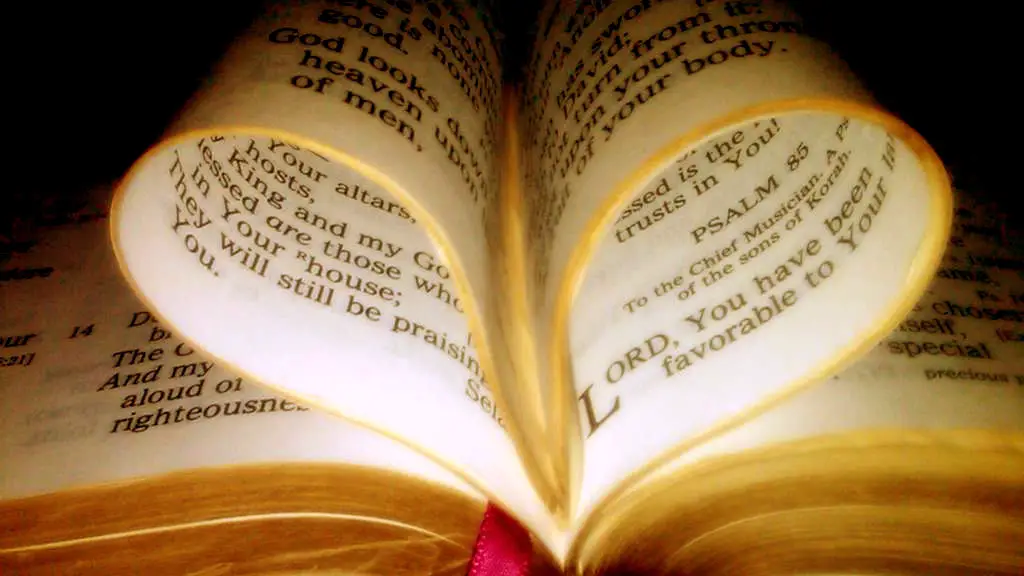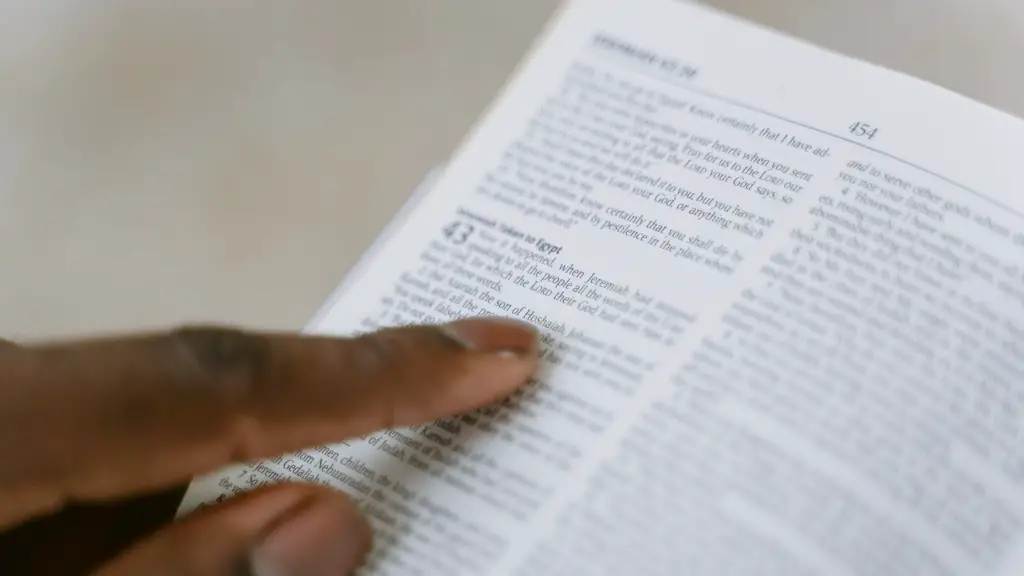The concept of purgatory, or an intermediary between Heaven and Hell, has existed since the Ancient Greek and Roman times. It is a belief still held in many cultures today, causing an ongoing debate among theologians and church leaders. So, what does the Bible say about purgatory? Does it exist, and if so, how?
The word purgatory is not mentioned by name in the Bible; however, many people believe that some passages imply its existence. For example, in 2 Maccabees 12:44-45, Judas Maccabeus is said to have sent a sacrificial offering for the sin of the dead, “that they might be released from their sins”. This offering is interpreted by some as indicating that people can be released from their sins through acts of righteousness, even after death. Similarly, 1 Corinthians 3:11-15 suggests that people can incur judgement after death based on their actions during life – this could be viewed as an indication of purgatory.
On the other hand, some theologians and church leaders argue that the passages which are interpreted as evidence of purgatory are not in fact referring to purgatory, but to the atonement of sins. They believe that through prayers and repentance, it is possible to cleanse a person’s spirit after death, freeing them from their sins. In this interpretation, purgatory is not a place for penance, but for redemption.
In addition to these academic discussions, many people have their own, personal opinions about purgatory. Some are adamant that it does not exist; others are confident in its existence and the power of prayer to bring redemption. Ultimately, the debate around purgatory often comes down to a matter of faith – whether or not one believes that purgatory exists and how they reconcile it with their own beliefs.
The concept of purgatory has been debated for centuries, and it is likely that the debate will continue as long as people continue to hold different beliefs. Although the Bible does not directly mention purgatory, its existence is still a matter of faith for many people and one that will likely remain open to interpretation.
Does It Affect Judgment?
The idea of purgatory is deeply intertwined with the concept of judgement. Many believers view purgatory as a place where sins can be absolved as part of the judgement process – a place between Heaven and Hell to which people must go to be judged and purged of their wrong-doings. If this is the case, then it could have important implications for our view of judgement and its relationship to Heaven and Hell.
Critics of this belief argue that the concept of purgatory implies the existence of a ‘middle ground’ between Heaven and Hell, and that this undermines the notion that judgement is absolute and final. They argue that it suggests that judgement is not as ‘black and white’ as it is often portrayed, and that it is possible to find a way back to Heaven even if one has committed sin.
Those who believe in purgatory see it differently. They argue that judgement is not just about punishment, but also about absolution and temporal punishment to pay for one’s sins. In their view, purgatory can be seen as a place of cleansing, where one can repent and be purified before reaching Heaven. In this sense, they view purgatory as a complement to judgement, rather than a contradiction.
What Are Its Real-life Implications?
The concept of purgatory and its implications for judgement are often discussed in the context of theological debate. However, it also has real-life implications for those who hold a belief in it. Believers often practice prayer and repentance as a way of purifying a person’s soul; offering prayers for the deceased is also common practice, in the hope of helping them to attain redemption.
In addition to offering prayers for those who have passed away, people can also ask for prayers for their own souls, in the hope of being purified and accepted into Heaven after death. This type of prayer is known as a ‘prayer of purification’ and is one way to show one’s faith in the concept of purgatory.
Prayer is not the only way to demonstrate faith in purgatory. There are also numerous charitable and philanthropic works that one can carry out in the hope that they will benefit the souls of the deceased and bring them closer to redemption. These activities – ranging from donating to charities to volunteering one’s time – are often done with the belief that one’s own soul will also be purified in the process.
Is Purgatory a Visual Representation?
The concept of purgatory is often portrayed in religious artwork, from illuminated manuscripts to modern films. It is a powerful image, used to depict a place of pain, punishment and purification. In some cases, these visual representations are used to illustrate the idea that repentance and sanctification are necessary for one’s soul to enter Heaven.
However, these depictions of purgatory can also be misleading. They often show a place of great torment and violence, when in fact the original idea of purgatory was of a place of purification and redemption. It is important to remember that these visual representations are just that – representations – and they should not be taken as literal representations of purgatory.
The concept of purgatory can also be seen in popular culture. It is often portrayed as a metaphysical place, such as in the novel ‘The Lovely Bones’, which tells the story of a young girl who is murdered, and then has to find her way through purgatory to reach Heaven. This type of representation often reinforces the idea of purgatory as a place of suffering, when in reality it is meant to be a place of liberation.
What Does It Mean For Doctrine?
For many believers, the concept of purgatory forms an important part of their understanding of judgement, redemption and the afterlife. It is a concept that has been around for centuries and is included in the official doctrines of many religious organisations. For some, the idea of purgatory is integral to their understanding of sin and punishment, and for others, it provides comfort and hope that the wrongs in life can still be made right after death.
However, there are some who view the concept of purgatory with scepticism, viewing it as a distraction from traditional teachings about the afterlife. For them, the idea of purgatory reinforces the notion that divine judgement can be overturned by human intervention, which can be seen as a contradiction to the idea of an all-powerful and all-knowing deity.
Regardless of one’s beliefs, the concept of purgatory raises many important questions, both theological and philosophical. It raises questions about judgement, redemption and free will; and it forces us to consider our own beliefs on these complex issues. Ultimately, the idea of purgatory will continue to be the subject of debate and discussion for many years to come.
How Is Purgatory Used in Modern Religion?
The concept of purgatory has been around for centuries, and it is still an important part of many religious beliefs today. In some traditions, it is a fundamental part of their theology, while in others it is seen as more of an optional belief. Whatever one’s beliefs, the concept of purgatory is still seen as a necessary part of personal spiritual growth and religious practice.
In modern religion, purgatory is often seen as a form of punishment for sins committed in life. It can be used for a variety of purposes, from teaching lessons about right and wrong, to purifying the soul for entry into Heaven. Many religious organisations use purgatory as part of their spiritual practice, such as in the form of prayers for the dead or charitable works in the name of the deceased.
In recent years, the concept of purgatory has also been used in popular culture, notably in films such as ‘The Lovely Bones’ and ‘What Dreams May Come’. These stories provide a powerful illustration of the concept of purgatory, and help to make it more accessible to a wider audience. They also provide a platform for exploring the idea of judgement, repentance and redemption.
Whether one believes in purgatory or not, it is clear that the concept is one that has been around for centuries and one that is still relevant today. It raises many questions about our beliefs and practices, forcing us to confront our own understanding of judgement, guilt and repentance. Ultimately, it is a concept that is full of spiritual and philosophical debate and one that will remain a part of religious discourse for many years to come.





